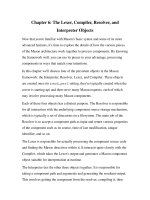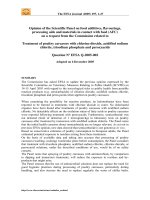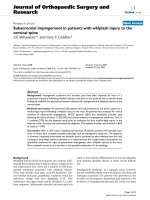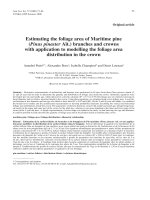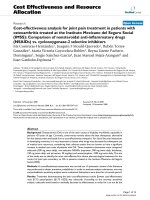Regulation of growth and flowering in tuberose with application of bio-regulators
Bạn đang xem bản rút gọn của tài liệu. Xem và tải ngay bản đầy đủ của tài liệu tại đây (241.2 KB, 5 trang )
Int.J.Curr.Microbiol.App.Sci (2018) 7(9): 1622-1626
International Journal of Current Microbiology and Applied Sciences
ISSN: 2319-7706 Volume 7 Number 09 (2018)
Journal homepage:
Original Research Article
/>
Regulation of Growth and Flowering in Tuberose with
Application of Bio-Regulators
Sangram S. Dhumal*, Manpreet Kaur, Pradeep Dalave, Vishnu K. Garande,
Ravi D. Pawar and Shriram S. Ambad
Department of Horticulture, College of Agriculture, Kolhapur-416004, Maharashtra, India
*Corresponding author
ABSTRACT
Keywords
Tuberose, Phule
Rajani, Bioregulators,
GA3, IBA, Growth,
Flowering
Article Info
Accepted:
10 August 2018
Available Online:
10 September 2018
The effect of different levels of GA3 (40, 80, 120 and 160 ppm) and IBA (20, 40, 60 and
80 ppm) on the regulation of growth and flowering in Tuberose cv. Phule Rajani was
studied. The bioregulators were applied as dip treatment of tuberose bulbs for 24 hrs
before planting and as a spray 30 day after planting. The application of bioregulators;
soaking as well as spraying, was found to be effective in manipulating the growth and
flowering traits as compared to control. Soaking of the tuberose bulbs in 160ppm GA3
solution for 24 hours before planting significantly increased plant height (53.73cm) with
highest number of leaves per plant (33.17) and width of leaf (23.97mm). It also registered
minimum number of days for spike emergence (59.67). Significant increase in length of
spike (63.77cm) and rachis (28.19cm), maximum number of spikes per plant (3.57), florets
per spike (24.54), number of bulbs per plant (10.07), bulblets per plant (19.32), weight of
bulbs per plant (194.62 gm) and highest vase life (9.87 days) was recorded in dipping
treatment of tuberose bulbs in 160ppm GA3 for 24 hours before planting which was
followed by the treatments; spraying with 160 ppm GA 3, soaking in 80 ppm IBA and
spraying of 80ppm IBA 30 days after planting.
Introduction
Tuberose (Polianthes tuberosa L.), an
ornamental bulbous plant, is commercially
grown for its attractive and luring cut flowers
in tropical and subtropical areas of country. It
has an enormous economic potential for cut
flower trade and essential oil industry. As per
area and production statistics of the National
Horticulture Board, the total area under
tuberose cultivation in the country is about
7.95 lakh hectares. Tuberose planted at a
spacing of 30 x 30cm with a plant population
of 1,11,000 plants/ha yield about 90,000
marketable spikes and 1.8 lakhs flowering size
bulbs. This traditional flower crop of
Indiablooms throughout the year and its
clustered spikes are rich in fragrance; florets
are star shaped, waxy and loosely arranged on
spike that can reach up to 30 to 45 cm in
length. The spikes are useful as cut flowers in
vase decoration and bouquets; while
individual floret is used for making veni,
garland, button-holes or crown. It has a
delightful fragrance and is the source of
tuberose oil. The natural flower oil of tuberose
1622
Int.J.Curr.Microbiol.App.Sci (2018) 7(9): 1622-1626
is one of the most expensive raw materials for
perfume, thereby contributing in export
earnings.
Tuberose cv. Phule Rajani under Kolhapur
conditions of Maharashtra state of India.
Materials and Methods
Increased demand for its cut-flower and
aesthetic use has led to improvisation in
cultural practices with sole aim of enhancing
yield and quality of tuberose plant. Exogenous
application of plant growth regulators is being
practiced by the commercial growers as a part
of cultural practice to improve the different
economically important and market desirable
characteristics of this flower plants. Sarkar et
al., (2009) reported increased no. of bulb per
plants, weight of individual bulb and total bulb
yield when different growth regulators (NAA
and IBA) were applied as dip treatment under
north Indian conditions.GA3 is the most
effective plant growth regulator for growth
and flowering of tuberose at a concentration of
300 ppm (Amin et al., 2016). Mukhopadhyay
et al., (1983) found that the plant height was
reduced with ethrel spray at high
concentration and spike length and floret
numbers per spike was increased with GA3
application under Bangalore conditions. Plant
response to foliar application of plant growth
regulators (PGRs) is often variable, in part due
to environmental factors. High humidity and
longer drying time often are also reported to
increase PGR uptake in laboratory studies
(Stover et al., 2005).
Therefore there is need to investigate the
effective concentrations of PGR and their
response
under
varied
environmental
conditions of country for optimizations of
technique. This study entitled “effect of
application of bio-regulators on growth and
flowering of Tuberose var. „Phule Rajani‟ was
carried out at the field of Horticulture section,
college of Agriculture Kolhapur where
average temperature varies between 230C to
310C over the year. The objective of this study
was to find the effect of bio-regulators on the
regulation of growth and flowering in
The experiment entitled “Effect of application
of bio-regulators on growth and flowering of
Tuberose var. „Phule Rajani‟ ” was carried out
at the field of Horticulture section, college of
Agriculture Kolhapur during the year 2009-10.
Healthy bulbs of tuberose var. Phule Rajani of
uniform size were planted at the spacing of 30
x 30 cm. The experiment was laid out in
Randomized Block Design with three
replications.
The soaking was done 24 hours before
planting and spraying was done 30 days after
planting. Tuberose varieties „Phule Rajani was
used for the study (2009-2010). The bulbs
were procured from the Department of
Horticulture, MPKV, Rahuri MH. Healthy
Bulb sized about 2.0 cm were used as planting
material. The chemicals used in experiment
were gibberellic acid (GA3) and indole-3butryric
acid
(IBA).The
experiment
considered 17 treatment of soaking and
spraying of GA3 and IBA respectively. The
treatments comprise four levels of GA3 (40,
80, 120 and 160 ppm) and four levels of IBA
(20, 40, 60 and 80 ppm) respectively.
Sufficient volume of a particular growth
regulator solution was used for soaking of
bulb and then bulbs were dried overnight
under ambient conditions before planting.
Different parameters were recorded pertaining
to growth, flowering and bulb production.
Results and Discussion
Effect of GA3 and IBA on vegetative growth
Data presented in Table 1, showed increased
height, no of leaves per plant, and width of
leaf with different concentrations of growth
regulators when compared with control. The
1623
Int.J.Curr.Microbiol.App.Sci (2018) 7(9): 1622-1626
maximum number of leaves per plant (33.17),
plant height (53.73), and width of leaf (23.97)
was recorded with soaking treatment at
180ppmfollowed by spraying of 160 ppm GA3
in the cultivar Phule Rajni. GA3has been
applied to improve various characteristics in
tuberose plant including the plant height
[Shankar et al., (2010); Kumar and Gautam,
(2011) and Amin et al., (2011)] and number of
leaves [Shradha et al., (2002) and Singh,
(1999)]. The effect of gibberellins on growth
characteristics may be due to the cell
elongation and rapid cell stimulation in the
bulbs and increasing auxin level of tissue or
enhance the conversion of tryptophan to IAA
which causes the cell division and cell
elongation [(Amin et al., (2011)].
Minimum day (59.42) for spike emergence
was recorded from spraying GA3 at 160 ppm
concentration. Soaking bulb in GA3 at 180
ppm concentration recorded maximum spike
length (63.77cm) which was in significance
with control (57.71cm) (Table. 1). These
results were in accordance with the findings of
Jana and Biswas (1979) and Mukhopadhyay
and Bankar (9) in tuberose; and Bhattacharjee
(3) in gladiolus. Increased cell division and
elongation as accelerated by PGR application
might resulted in increased spike length as
reported by Shanker et al., (2010) and Tiwari
and Singh (2002) in tuberose.
Maximum rachis length was obtained with
GA3 at concentration of 180 ppm which was
in conformity with Devadanam et al., (2005).
Table.1 Effect of application of bio-regulators on growth characteristics
Tuberose var. „Phule Rajni‟
Treatments
T1- Control
T2- GA3 40 ppm
T3- GA3 80 ppm
T4- GA3 120 ppm
T5- GA3 180 ppm
T6- IBA 20 ppm
T7- IBA 40 ppm
T8- IBA 60 ppm
T9- IBA 80 ppm
T10- GA3 40 ppm
T11- GA3 80 ppm
T12- GA3 120 ppm
T13- GA3 160 ppm
T14- IBA 20 ppm
T15- IBA 40 ppm
T16- IBA 60 ppm
T17- IBA 80 ppm
`F’ test
SE (m)+
CD at 5%
Leaves per Height of Width of
plant
plant
leaf (mm)
(cm)
23.33
47.37
18.31
28.43
50.63
20.83
31.12
51.87
20.09
32.02
51.09
22.94
33.17
53.73
23.97
27.31
51.79
19.73
31.98
51.36
19.91
30.37
51.18
20.60
30.79
52.57
20.96
29.39
50.92
19.61
30.51
51.28
20.89
32.01
51.15
19.93
32.98
53.03
22.37
27.67
50.91
20.08
29.06
51.89
20.39
30.15
51.39
19.57
30.74
52.14
20.49
Sig.
Sig.
Sig.
0.421
0.502
0.373
1.276
1.523
1.132
1624
Days
for
spike
emergence
64.38
62.86
62.98
61.09
59.67
63.49
62.72
62.30
61.65
62.88
62.73
60.91
59.42
63.79
62.31
61.85
60.17
Sig.
0.569
1.725
Length of Length of
spike
rachis (cm)
(cm)
57.71
23.67
59.88
24.13
60.75
25.48
62.28
26.95
63.77
28.19
58.69
24.67
60.91
24.78
61.79
25.32
62.37
27.76
59.09
25.31
61.38
26.39
61.02
27.83
63.38
28.11
59.45
24.34
61.86
25.65
62.92
26.98
62.14
27.37
Sig.
Sig.
0.538
0.409
1.632
1.215
Int.J.Curr.Microbiol.App.Sci (2018) 7(9): 1622-1626
Table.2 Effect of application of bio-regulators on floral attributes of Tuberose var. „Phule Rajni‟
Treatments
T1- Control
T2- GA3 40 ppm
T3- GA3 80 ppm
T4- GA3 120 ppm
T5- GA3 180 ppm
T6- IBA 20 ppm
T7- IBA 40 ppm
T8- IBA 60 ppm
T9- IBA 80 ppm
T10- GA3 40 ppm
T11- GA3 80 ppm
T12- GA3 120 ppm
T13- GA3 160 ppm
T14- IBA 20 ppm
T15- IBA 40 ppm
T16- IBA 60 ppm
T17- IBA 80 ppm
`F’ test
SE (m)+
CD at 5%
Spikes per
plant
Florets
per spike
Vase life
(Days)
Bulbs per
plant
Bulblets
per plant
1.67
2.34
2.87
3.18
3.57
2.13
2.24
2.31
2.37
2.18
2.43
2.61
3.29
2.04
2.18
2.39
2.41
Sig.
0.017
0.052
19.33
20.89
22.79
22.16
24.54
21.98
21.67
22.47
23.82
21.33
22.18
23.97
24.18
21.37
22.34
22.61
23.67
Sig.
0.375
1.137
7.34
8.37
9.07
9.19
9.87
8.68
8.32
8.66
9.09
8.38
8.67
9.34
9.69
8.37
8.77
8.88
9.04
Sig.
0.267
0.811
5.76
7.89
9.23
9.74
10.07
7.13
8.22
8.87
9.33
6.87
7.54
7.37
9.97
6.02
6.11
7.23
8.94
Sig.
0.249
0.755
11.56
14.67
17.22
18.01
19.32
13.87
15.11
16.02
17.94
13.33
14.05
14.55
19.01
13.09
13.37
13.92
14.72
Sig.
0.374
1.134
Effect of GA3 and IBA on flowering
Significant improvement was observed in floral
and bulb characteristics viz. spikes per plant,
florets per spike, vase life, bulbs per plant,
bulblets per plant and weight of bulbs per plant
after PGR application when compared with
control. Maximum numbers of spike per plant
were registered with soaking bulbs in GA 180
ppm which was statistically identical with
spraying GA 160 ppm.
Maximum no. of floret per spike (24.54) was
observed at 180 ppm soaking of GA and the
minimum number of floret/ spike (19.33) in
control treatment. Among the different PGR
applications, GA3treatmentat 160ppmshowed
the highest vase life of 9.67 days which was in
accordance with Mukhopadhyay and Bankar
Wt. of
bulbs per
plant
125.32
153.76
162.17
181.89
194.62
149.89
161.78
167.12
171.81
157.98
165.09
179.93
189.11
139.98
142.63
159.88
168.91
Sig.
2.361
7.154
(1983). The favorable effect of GA3 might be
due to the fact that it accelerates carbohydrate
accumulation and increases metabolic activities
in the plants as reported by Singh et al., (2003)
The number of bulbs and bulblets per plant of
tuberose significantly affected with growth
regulators used in this study. High level of GA3
application led to increase in no. of bulb, bulblet
and weight of bulb per plant. The maximum
number of bulbs per plant (10.7) was recorded
at 180ppm GA3 dip treatment followed by
soaking of bulb in GA3application at 160 ppm.
Bulblets per plant (19.32) and weight of bulb
per plant (194.62) were also maximum at
180ppm GA3treatment. Similar results were
reported by Mukhopadhyay and Bankar (1983)
and Tonecki et al., (1979) in gladiolus and
Sarkar et al., (2009) in tuberose (Table 2).
1625
Int.J.Curr.Microbiol.App.Sci (2018) 7(9): 1622-1626
Soaking treatment with GA3 at 180ppm
significantly improved the different growth and
floral characteristics in tuberose over the other
PGR treatments studied in this experiment.
Soaking treatment at 180ppm was found
statistical identical with spraying treatment of
GA3 at 160 ppm for most of the studied floral
and bulb parameters.
References
Amin, M.R., Pervin, N., Nusrat, A., Mehraj, H.
and Jamal Uddin, A.F.M. (2017). Effect
of plant growth regulators on growth and
flowering of tuberose (Polianthes
tuberosa L.) cv. single. J. of Biosci Agri.
Res., 12(01), 1016-1020.
Bhattacharjee, S.K. (1983). Influence of growth
regulating
chemicals
on
Hippeastrumhybridum. Hort. Gdns. Bull.
36: 237-42.
Devadanam, A., Shinde, B. N., Sable, P. B. and
Vedpathak, S. G. (2005). Effect of foliar
spray of plant growth regulators on
flowering and vase life of tuberose
(Polianthes tuberose L.). J. Soils and
crops, 17(1), 86-88.
Dhua, R.S., S.K. Ghosh, S.K. Mitra, L.P. Yadav
and T.K. Bose, 1978. Effect of bulb size,
temperature treatment of bulb and
chemicals on growth and flower
production of tuberose (Polianthus
tuberosa L.) Acta Hort., No., 205, pp.
121-128.
Indian
Horticulture
database
(2014).
.
Jana, B.K. and S. Biswas (1979). Effect of
growth substances on growth and
flowering of tuberose (Polianthus
tuberosa L.) Haryana J. of Hort. Sci., 8
(3-4): 216-219.
Kumar, A. and Gautam, D. K. (2011). Effect of
plant growth regulators on spike yield and
bulb production of tuberose (Polianthes
tuberosa Linn.) cv. “Hyderabad Double”.
Progressive Hort., 43(2): 234-236.
Mukhopadhyay, A. and Banker, G.L.
(1983).Regulation
of growth
and
flowering in tuberose. J.Orn. Hort. 6: 8081.
Sarkar, J., Mishra, R.L., Singh, S.K., Prasad,
K.V., Arora, A. (2009). Effect of growth
regulators on growth and flowering in
tuberose under north India conditions. Ind
J. Hort. 66(4): 502- 507.
Shanker, K., Singh, A. K. and Singh, H. K.
(2010). Effect of plant growth regulators
on spike yield and bulb production of
tuberose double. Plant Archives, 11(1),
169-171.
Shradha, G., Belorkar, P. and Mohariya, V.
(2002). Effect of bulb soaking, foliar
spray of GA3 on growth, flowering, and
yield of tuberose. J. Soil Crops, 12:105-7.
Singh, A.K. 1999. Effect of growth regulators
ongrowth and flowering of tuberose. Acta
Hort.526:225-27.
Singh, P.V., S. Panwar and J. Kumar (2003).
Response of tuberose to plant growth
regulators. J. Orn Hort. Vol. 6 (1): 80-81.
Stover, E.W. and D.W. Greene. (2005).
Environmental effects on the performance
of foliar applied plant growth regulators:
A review focusing on tree fruits. Hort
Technology 15:214-221.
Tiwari, J. K. and Singh, R. P. (2002). Effect of
preplanting GA3 treatment on tuberose. J.
Orn. Hort. 5(2), 44-55.
Tonecki, J. (1979). Effect of growth substances
on shoot apex differentiation and changes
in sugars and free amino acids in
gladiolus. Acta Hort., No. 109, pp. 347355.
How to cite this article:
Sangram S. Dhumal, Manpreet Kaur, Pradeep Dalave, Vishnu K. Garande, Ravi D. Pawar and
Shriram S. Ambad. 2018. Regulation of Growth and Flowering in Tuberose with Application of
Bio-Regulators. Int.J.Curr.Microbiol.App.Sci. 7(09): 1622-1626.
doi: />
1626
